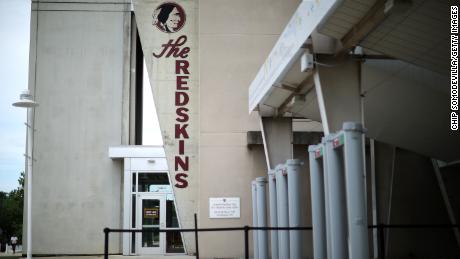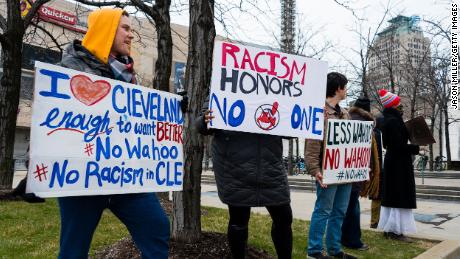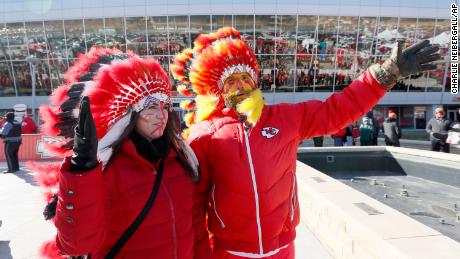(CNN)Spurred by mass protests against racism this summer, sports franchises with Native American-related names, mascots or logos faced pressure to stop using these stereotypes and caricatures.
Since then, the NFL's Washington Redskins and, as of Sunday, MLB's Cleveland Indians agreed to drop their monikers. Several others, including the Kansas City Chiefs and Chicago Blackhawks, made adjustments to their traditions but have defended their names and logos.
Native American leaders have long called on sports teams to move away from racist caricatures, stereotypes or, in the case of the NFL's Washington franchise, an ethnic slur.
"Change the Mascot is heartened to see the growing movement across professional sports to eliminate Native American mascots, and we hope this trend continues," Oneida Nation Representative Ray Halbritter, leader of the Change the Mascot campaign, said in a statement.
Here's a look at what these teams have said and done on the subject since this summer.
Washington Football Team
The NFL franchise in Washington, DC, dropped its moniker and changed its name to the Washington Football Team in July.
The prior name had long been denounced by Native American groups as an ethnic slur and a derogatory reference to skin color. The decision was finally made after this summer's protests and after pressure from some of the team's sponsors, including FedEx, which has the naming rights to the team's stadium.
"In light of recent events around our country and feedback from our community, the Washington Redskins are announcing the team will undergo a thorough review of (its) name," the franchise said in a statement at the time. "This review formalizes the initial discussions the team has been having with the league in recent weeks."
Faced with a tight deadline, the franchise decided on the "Washington Football Team" for this season pending the adoption of a new team name. The name change came with a new logo: a bold "W" in the same burgundy and gold colors.
The change was a long time coming. Once known as the Boston Braves, founder George Preston Marshall changed the team's name to "Redskins" in 1933 to avoid confusion with baseball's Boston Braves.
Efforts to change the name date at least as far back as 1971-72, as The Washington Post's Dan Steinberg has documented. Native American groups have consistently pushed the team to change its name, including in protests in 1992 and lawsuits in 1999 and 2009. In 2013, amid renewed calls for a name change, owner Dan Snyder told USA Today he would "never" do so.
This summer, the team removed Marshall's name from a facade in FedEx Field and removed a monument to him from outside the Redskins' former stadium. Marshall was well known for opposing integration of the NFL and didn't sign an African American to the roster until 1962 -- 16 years after the league started signing Black players.
Cleveland's baseball team
The Major League Baseball team in Cleveland will drop "Indians" from its name, though not immediately, team owner Paul Dolan said in a letter to fans Monday.
"This afternoon, we officially announced our organization has decided to begin the process of changing the name Indians and move forward to determine a new name that will better unify our community and build on our legacy for a new generation," he said.
The team will continue using the existing name and branding until a new one is chosen. The change was first reported by The New York Times.
In July, the franchise said it was reviewing its use of the name, citing the country's mass protests.
"The recent social unrest in our community and our country has only underscored the need for us to keep improving as an organization on issues of social justice," the team said then. "With that in mind, we are committed to engaging our community and appropriate stakeholders to determine the best path forward with regard to our team name."
The "Indians" name was originally chosen by the team and a group of baseball newspaper writers in 1915.
Though the exact story of its origin is unclear, the name was partly based on the contemporary success of the Boston Braves, who won the 1914 World Series, as well as on Louis Sockalexis, a former Native American baseball star in Cleveland who died in 1913, according to Cleveland Magazine.
Cleveland removed its "Chief Wahoo" logo, a racist caricature of a Native American character, from their uniforms after the 2018 season.
Kansas City Chiefs
The NFL's Kansas City Chiefs announced in August that fans won't be allowed to wear ceremonial headdresses or have Native American-style face paint in the team's stadium.
In addition, the team's leadership is reviewing the fans' use of the controversial tomahawk chop as well as Arrowhead Stadium's area known as "Drum Deck," where people hit a giant native-style drum embellished with the team's logo to open each game. The team said it was exploring ways to modify its use of drums in a way that "better represents the spiritual significance of the drum in American Indian cultures."
The Chiefs said the changes were a result of discussions with "a group of local leaders from diverse American Indian backgrounds and experiences" over the past six years.
"As an organization, our goal was to gain a better understanding of the issues facing American Indian communities in our region and explore opportunities to both raise awareness of American Indian cultures and celebrate the rich traditions of tribes with a historic connection to the Kansas City area," the team said.
The Chiefs were named after a White man who impersonated Native American culture.
Vincent Schilling, a Mohawk journalist who has covered sports and writes on Native American culture, said the name started with the Boy Scouts' honor society Tribe of Mic-O-Say, which was created by Harold Roe Bartle in 1925.
Bartle was not Native American, but he went by the name "Chief Lone Bear" or just "Chief" in his Mic-O-Say organization. He later became the mayor of Kansas City, Missouri, and helped persuade Lamar Hunt, the owner of the Dallas Texans football team, to bring the team to Kansas City. The name "Chiefs" was chosen in Bartle's honor.
Over the years, the team has taken on the stereotyped actions and costumes of Native Americans.
Fans sometimes perform a tomahawk chop or wear feathered headdresses or face paint. In the 1970s and '80s, the team's mascot was a man in a ceremonial Native American outfit atop a horse named Warpaint. The mascot has since been retired in favor of an anthropomorphic wolf.
Atlanta Braves
MLB's Atlanta Braves defended their name and did not address a potential name change in response to CNN's questions back in July.
"The Atlanta Braves honors, supports, and values the Native American community. That will never change," the statement said. "The Atlanta Braves relationship with the Native American community goes back many years and over the past several months, we have created an even stronger bond with various Native American tribes, both regionally and nationally, on matters related to the Braves and Native American culture."
The team also said it held meetings with its Native American Working Group to collaborate on issues and "amplify their voices and show our fans they are still proudly here."
In recent weeks, the team has made several public efforts to show that support.
The Braves tweeted their support and thanks for Gov. Brian Kemp's proclamation that November 27 be recognized as Native American Heritage Day. Atlanta Braves President and CEO Derek Schiller attended the event with members of the Georgia Council on American Indian Concerns.
Days later, the team partnered with the Eastern Band of the Cherokee Indians to sell a T-shirt emblazoned with the Atlanta "A" logo and the word "ßÄĀßÅüßÅ”ßÄźßÅŹßÄ®," meaning "ball player" in syllabary.
The baseball team, originally based in Boston, became the "Braves" in 1912 under owner James Gaffney. Gaffney was affiliated with the Democratic Party's political machine of Tammany Hall, which had an Indian in headdress as its emblem.
Atlanta's logo includes a tomahawk, and fans often perform a tomahawk chop with foam cutouts and chants. The motion started at Florida State University but was adopted by the Braves in 1991 following the signing of former FSU three-sport star Deion Sanders.
The chiefs of tribal nations that once inhabited Georgia have said the tomahawk chop is insensitive and inappropriate. In the 2019 playoffs, St. Louis Cardinals pitcher Ryan Helsley, a member of the Cherokee Nation, criticized the tomahawk chop as disrespectful.
"I think it's a misrepresentation of the Cherokee people or Native Americans in general," he said.
Chicago Blackhawks
The National Hockey League's Chicago Blackhawks decided in July not to change their name and logo, a large Native American head with feather headdress and face paint, because they honor a specific Native American.
"The Chicago Blackhawks' name and logo symbolizes an important and historic person, Black Hawk of Illinois' Sac & Fox Nation, whose leadership and life has inspired generations of Native Americans, veterans and the public," the team said in a statement.
"We celebrate Black Hawk's legacy by offering ongoing reverent examples of Native American culture, traditions and contributions, providing a platform for genuine dialogue with local and national Native American groups. As the team's popularity grew over the past decade, so did that platform and our work with these important organizations."
Still, the team did decide to ban costume headdresses at team-sanctioned events and home games.
The Blackhawks were named by owner Frederic McLaughlin in 1926.
McLaughlin was a commander with the 333rd Machine Gun Battalion of the 86th Infantry Division -- nicknamed the "Blackhawk Division" after the Native American warrior Chief Black Hawk -- during World War I, according to the team.
The team's mascot is a bird known as "Tommy Hawk."
The Chicago Blackhawks Foundation previously partnered with the American Indian Center of Chicago (AIC) to educate the public about American Indians, but the AIC ended that agreement in 2019.
"Going forward, AIC will have no professional ties with the Blackhawks or any other organization that perpetuates harmful stereotypes," they said.













